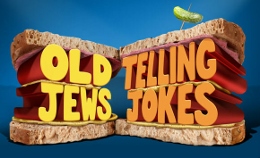WHAT, WOULD IT KILL YOU TO HEAR A JEWISH JOKE, I ASK YOU?
A German, a Frenchman, and a Jew are crawling across the desert. The German says, “Mein Gott! I’m so hot and thirsty and tired. I must have a beer!” The Frenchman says, “Mon Dieu! I’m so hot and thirsty and tired. I must have some 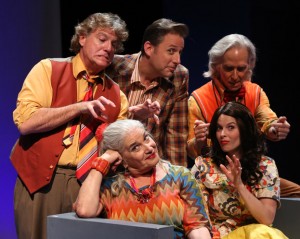 wine!” The Jew says, “My God! I’m so hot and thirsty and tired. I must have diabetes!”
wine!” The Jew says, “My God! I’m so hot and thirsty and tired. I must have diabetes!”
Already offended? Then skip Old Jews Telling Jokes. But if you’re more like the hundred or so people in the house last night, you can feel the difference between attacking a minority group and lovingly saluting the stereotypes and schtick that launched the careers of so many Jewish comics in the 50s and 60s. Whether it’s playing off the overbearing Jewish mother or the need to make the perfect business deal or being a little on the hypochondriac side, we Jews have been finding the funny in ourselves longer than the goyim have. It’s just taken a few centuries of oppression for the goyim to stop and realize that it’s actually better just to laugh at/with us.
In a way, the title says it all. There’s no plot, no continuing characters to list, and no beginning-middle-end to this production. It really is 90 minutes of jokes being presented. But I use the word “presented” rather than “told” because that’s part of what makes this production different: We’ve all heard jokes told, but rarely do we see them acted out. There’s something very sweet in the Vaudevillian style of thirty seconds with two characters, a punch line, and then moving on to a new premise. Writers Daniel Okrent and Peter Gethers use a number of devices to break the 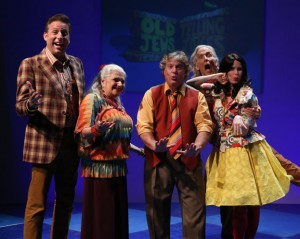 feeling of sameness in a non-stop hour and a half. Keyboard music and singing pops up, jokes are lumped into categories, and even cuts to video are interjected, including a brilliant piece from the late Alan King.
feeling of sameness in a non-stop hour and a half. Keyboard music and singing pops up, jokes are lumped into categories, and even cuts to video are interjected, including a brilliant piece from the late Alan King.
In another way, the title is a bit misleading, in that the five-person cast appears to contain one person from each decade from 30 to 70’”so the “old” reference seems more in spirit than reality. This is not miscasting; the two youngest even refer to themselves as the “Young Jews” early on. It’s actually better for this show to have that diversity in age because the jokes frequently deal with young people and sex (and oy, old people and sex, plenty as well!) so the range of players allows for that.
The cast, both from names and faces, is clearly not fully comprised of five members of the tribe, but they address that, too, in a clever way’”alluding to the fact that one need not be of the faith to be of the humor. Each member is comfortable in bringing the jokes to life under John Anderson’s direction. Voice talent varies greatly in the singing, but for once, one doesn’t really care; it’s just all in good spirit. If there’s a 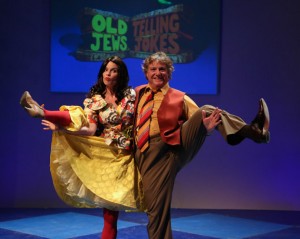 stand-out in the cast, it’s Allison Spratt Pearce whose campy nature allows her to rise above even the lesser of the jokes.
stand-out in the cast, it’s Allison Spratt Pearce whose campy nature allows her to rise above even the lesser of the jokes.
There are a few touching moments in the show where the characters talk as someone remembering the power of humor at key points in their lives. In one sense, it is effective because the writing and the stories are good; in another, it’s odd because they are talking directly to us, in the first person, but it doesn’t feel like it’s truly their story. If these stories are indeed someone’s, then the book should reflect that early on so we know that, like in the Vagina Monologues, we are hearing someone’s tribute to humor. As it is, in cutting from joke-telling to this serious place, it feels like someone is lying to us by stepping out, looking us in the eye, and saying this happened to them’”when it didn’t.
Is it cornier than a can of Orville Reddenbacher? Unquestionably. Have you heard some of these jokes before? Of course you have. But whether there’s some new material in there or the writers managed to find less prevalent jokes, this internet junkie hadn’t heard at least 70% of them before’¦and plans to repeat some over a few Manischewitz schpritzers this weekend. Given the amount of laughter both 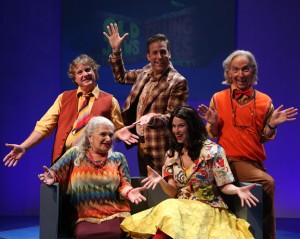 from and surrounding me, I suspect more than a few lines from this show are going to be circulating at temples (and churches) in the weeks to come.
from and surrounding me, I suspect more than a few lines from this show are going to be circulating at temples (and churches) in the weeks to come.
Will you get verklempt as if you were watching Yentl? No. Will you want to dance in the aisles like at Fiddler? Not so much. But I ask you: What would it hurt to catch an early-bird special, come down to the Lyceum, park your tuchus for ninety minutes, laugh with a few mensches on stage, and maybe share a coffee in the lobby? Nothing it would hurt, that’s what. Just get your coffee before Yetta does’¦or she’ll take all the Sweet’N Lows home to Morty and you’ll get bupkiss.
photos by Ken Jacques
Old Jews Telling Jokes
Lyceum Theatre
scheduled to end on May 25, 2014
for tickets, call 619.544.1000 or visit Playhouse Info
